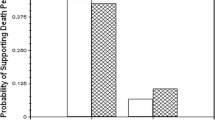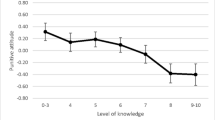Abstract
This study tests the three hypotheses derived from the written opinion of Justice Thurgood Marshall in Furman v Georgia in 1972. Subjects completed questionnaires at the beginning and the end of the fall a semester. Experimental group subjects were enrolled in a death penalty class, while control group subjects were enrolled in another criminal justice class. The death penalty class was the experimental stimulus. Findings provided strong support for the first and third hypotheses, i.e., subjects were generally lacking in death penalty knowledge before the experimental stimulus, and death penalty proponents who scored “high” on a retribution index did not change their death penalty opinions despite exposure to death penalty knowledge. Marshall’s second hypothesis--that death penalty knowledge and death penalty support were inversely related--was not supported by the data. Two unexpected findings were that death penalty proponents who scored “low” on a retribution index also did not change their death penalty opinions after becoming more informed about the subject, and that death penalty knowledge did not alter subjects’ initial retributive positions. Suggestions for future research are provided.
Similar content being viewed by others
References
Beccaria, C. (1963). On crimes and punishments. Englewood Cliffs, New Jersey: Simon and Schuster.
Blecker, R. (2007). “A debate on capital punishment.” The Department of Criminal Justice and Legal Studies, University of Central Florida First Annual Speakers’ Series, March 22.
Bohm, R. M. (1989). The effects of classroom instruction and discussion on death penalty opinions: a teaching note. Journal of Criminal Justice, 17, 123–131.
Bohm, R. M. (1990). Death penalty opinions: effects of a classroom experience and public commitment. Sociological Inquiry, 60, 285–297.
Bohm, R. M. (2007). Deathquest III: An introduction to the theory and practice of capital practice of capital punishment in the United States (3rd ed.). Cincinnati: Anderson Publishing.
Bohm, R. M., Clark, L. J., & Aveni, A. F. (1990). The influence of knowledge on death penalty opinions: an experimental test. Justice Quarterly, 7, 175–188.
Bohm, R. M., Clark, L. J., & Aveni, A. F. (1991). Knowledge and death penalty opinion: a test of the Marshall hypothesis. Journal of Research in Crime and Delinquency, 28, 360–387.
Bohm, R. M., & Vogel, R. E. (1991). Educational experiences and death penalty opinions: stimuli that produce change. Journal of Criminal Justice Education, 2, 69–80.
Bohm, R. M., & Vogel, R. E. (1994). A comparison of factors associated with uninformed and informed death penalty opinions. Journal of Criminal Justice, 22(2), 125–143.
Bohm, R. M., & Vogel, B. L. (2004). More than ten years after: the long-term stability of informed death penalty opinions. Journal of Criminal Justice, 32, 307–327.
Bohm, R. M., Vogel, R. E., & Maisto, A. A. (1993). Knowledge and death penalty opinion: a panel study. Journal of Criminal Justice, 21, 29–45.
Clarke, A. W., Lambert, E., & Whitt, L. A. (2000-01). Executing the innocent: the next step in the Marshall hypotheses. Review of Law and Social Change, 26, 309–345.
Cochran, J. K., & Chamlin, M. B. (2005). Can information change public opinion? Another test of the Marshall hypotheses. Journal of Criminal Justice, 33, 573–584.
Cochran, J. K., Sanders, B., & Chamlin, M. B. (2006). Profiles in change: an alternative look at the Marshall hypotheses. Journal of Criminal Justice, 17, 205–226.
Cottingham, J. (1979). Varieties of retributivism. Philosophical Quarterly, 29, 238–246.
Ellsworth, P. C., & Ross, L. (1983). Public opinion and capital punishment: a close examination of the views of abolitionists and retentionists. Crime and Delinquency, 29, 111–169.
Jones, J.M. (2006). “Two in three favor death penalty for convicted murderers.” The Gallup Organization, www.gallup.com/poll/releases/pr020520.asp.
Lambert, E., & Clarke, A. (2001). The impact of information on an individual’s support of the death penalty: a partial test of the Marshall hypothesis among college students. Criminal Justice Policy Review, 12, 215–234.
Lee, G. (2008). A painless cocktail? The lethal injection controversy. In R. M. Bohm (Ed.), The death penalty today. Boca Raton, FL: CRC Press.
Lord, C. G., Ross, L., & Lepper, M. R. (1979). Biased assimilation and attitude polarization: the effects of prior theories on subsequently considered evidence. Journal of Personality and Social Psychology, 37, 2098–2109.
Payne, B. K., & Chappell, A. (2008). Using student samples in criminological research. Journal of Criminal Justice Education, 19(2), 175–193.
Sandys, M. (1995). Attitudinal change among students in a capital punishment class: it may be possible. American Journal of Criminal Justice, 20, 37–55.
Sarat, A., & Vidmar, N. (1976). Public opinion, the death penalty, and the eighth amendment: testing the Marshall hypothesis. Wisconsin Law Review, 17, 171–206.
Vidmar, N., & Dittenhoffer, T. (1981). Informed public opinion and death penalty attitudes. Canadian Journal of Criminology, 23, 43–56.
Wicker, A. W. (1969). Attitudes versus actions: the relationship of verbal and overt behavioral responses to attitude objects. Journal of Social Issues, 25, 41–78.
Williams, F. P., Longmire, D. R., & Gulick, D. B. (1988). “The public and the death penalty: opinions as an artifact of question type. Criminal Justice Research Bulletin, 3, 1–5.
Wright, H. O., Jr., Bohm, R. M., & Jamieson, K. M. (1995). A comparison of uninformed and informed death penalty opinions: a replication and expansion. American Journal of Criminal Justice, 20, 57–87.
Author information
Authors and Affiliations
Corresponding author
Rights and permissions
About this article
Cite this article
Lee, G.M., Bohm, R.M. & Pazzani, L.M. “Knowledge and Death Penalty Opinion: The Marshall Hypotheses Revisited.”. Am J Crim Just 39, 642–659 (2014). https://doi.org/10.1007/s12103-013-9229-z
Received:
Accepted:
Published:
Issue Date:
DOI: https://doi.org/10.1007/s12103-013-9229-z




